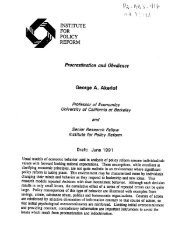foreign donations programs - PDF, 101 mb - usaid
foreign donations programs - PDF, 101 mb - usaid
foreign donations programs - PDF, 101 mb - usaid
Create successful ePaper yourself
Turn your PDF publications into a flip-book with our unique Google optimized e-Paper software.
imately $170 million, including applicable ocean transportation<br />
costs, with eventual payment in dollars. The<br />
agreements involve approximately 61.0 million bushels<br />
of wheat, 6.4 million bushels of feed grains and 143,600<br />
bales of cotton, plus important amounts of other surplus<br />
agricultural commodities. (Appendix tables 31 and 34.)<br />
From the signing of the first title IV agreement on<br />
August 21, 1961 through Dece<strong>mb</strong>er 31, 1965, a total of<br />
65 agreements and amendments have been signed with<br />
the governments of 23 countries. These provided for<br />
financing exports of surplus agricultural commodities<br />
having a market value of approximately $539 million,<br />
including ocean transportation costs 2 and representing<br />
a total CCC commitment of about $698 million,<br />
To protect regular cash export markets during the<br />
supply periods covered by the agreements and amendments<br />
signed, the purchasing countries are required to<br />
maintain normal commercial imports friom the United<br />
States and other free world sources. Under the agreements<br />
and amendments entered into during 1965, these<br />
commitments to make commercial imports totaled more<br />
than 433,000 metric tons of wheat, 8,600 metric tons of<br />
feed grains, 349,000 bales of cotton, 29,500 metric tons<br />
of edible vegetable oils, 43,000 metric tons of rice, and<br />
3,763 metric tons of tobacco,<br />
Shipments under title IV are continuing to increase in<br />
volume, totaling about 1.7 million metric tons in 1965.<br />
This was approximately equal to the cumulative quantity<br />
of all such previous title IV exports. The market value<br />
of the 1965 of shipments th 1965shipents was as aout about $23 $123 nillion, m ln bringreatly ringing to<br />
$315 million the value of all title IV shipments through<br />
Dece<strong>mb</strong>er 31, 1965.<br />
Dollar repayments to the United States from governnent-to-govcrnment<br />
agreements began in 1963 and<br />
amounted to approximately $2.3 million in principal and<br />
interest in that year. Repayments in 1964 totaled $5.5<br />
million, and in 1965 were $26.8 million ($21.4 million<br />
principal and $5.4 million interest). As of )ece<strong>mb</strong>er<br />
31, 1965, therefore, cumnulative dollar repayments under<br />
title IV govcrnment-to-governmment sales agreements<br />
2 At least 50 percent of the volume of earh commodity procred<br />
under title IV is required to be shipped on U.S.-flag vessels. The<br />
cost of shipping on U.S. vessels is financed under title IV agreements<br />
and dollar repayment is made by the recipient country of<br />
that portion of the costs equivalent to the <strong>foreign</strong> flag rate.<br />
110<br />
totaled $34.6 million (26.7 million principal and $7.9<br />
million interest).<br />
In addition to pursuing the objective of maximizing<br />
immediate dollar sales of U.S. agricultural commodities,<br />
title IV <strong>programs</strong> are designed to develop future <strong>foreign</strong><br />
markets for U.S. agricultural comnmodities and to assist<br />
in the economic and social development of friendly<br />
nations through extension of credit.<br />
IWith these objectives in mind, and to assure that the<br />
purchasing government's use of the credit is coordinated<br />
with other U.S. development and assistance <strong>programs</strong> in<br />
the country, the recipient country and the United States<br />
negotiate an understanding regarding the purposes for<br />
which the government of the purchasing country shall use<br />
the local currencics which become available to it from<br />
tlhe local sale of the title IV comnmodities.<br />
The negotiation of title IV agreements may also<br />
include mutual 9nderstandingsthe relating to importing<br />
country's use of the commodities or conditions affecting<br />
their sale and distribution. In negotiating the initial<br />
title IV, Public Law 480, agreement with the Government<br />
of Iran, for example, mutual agreement was<br />
reached concerning reductions of inland rail freight rates<br />
so as to facilitate tile use of imported corn for livestock<br />
feeding. Iran subsequently reduced the freight rate on<br />
corn and other feed grains to<br />
wheat<br />
the same<br />
and<br />
rate<br />
eliminated<br />
applicable<br />
the<br />
to<br />
commercial profit tax on in<br />
barriers to the use of imported feed grains forlivestock<br />
barriers the us a impotedtowad denfelietock<br />
feeding. This is a first step toward development of'<br />
enlarged donmestic dairy and livestock industry in<br />
Iran and creates a potential commercial market for U.S.<br />
feed grains.<br />
The agreement with the Ryukyu Islands is another<br />
example of the way in which title IV sales proceeds are<br />
used to assist economic development of the country and<br />
develop potential markets for U.S. agricultural conmodities.<br />
Here, also, more livestock output is needed<br />
to meet loca; demnand. Some of the title IV-financed<br />
projects reach the farmu level in the form of loans to<br />
individual livestock producers. Producer loans made<br />
thus far total 82, primrily for hog production. Title IV<br />
sales proceeds are also being used to finance construction<br />
oales or mmareting sgterinand prcin<br />
of facilties for marketing, slaughtering, and processing<br />
livestock and livestock products and for importing, processing,<br />
and distributing grain. These projects will build

















